John Janaro's Blog, page 252
July 15, 2015
Summer "Stay-cation" at the Pool
 The closest thing to a "vacation" for the Janaros this summer is this local pool/camping area that we were able to join (no, we're not going camping). There are two pools, and on many afternoons they look like this (above) when we arrive!
The closest thing to a "vacation" for the Janaros this summer is this local pool/camping area that we were able to join (no, we're not going camping). There are two pools, and on many afternoons they look like this (above) when we arrive! The problem is that, on many days this summer, the sky has looked like this!!!
The problem is that, on many days this summer, the sky has looked like this!!! The sky started out looking bright here, but eventually the clouds rolled in. Still, it gave us several hours of good pool weather.
The sky started out looking bright here, but eventually the clouds rolled in. Still, it gave us several hours of good pool weather. Josefina had fun making faces. Then she smiled.
Josefina had fun making faces. Then she smiled. I had a good time at the pool too. Here are Jojo and I drying off, looking like monks or desert nomads with our "towel-heads."
I had a good time at the pool too. Here are Jojo and I drying off, looking like monks or desert nomads with our "towel-heads." We were done and on our way home by the time the rain came. There you see it falling in what looks like fog on the hills.
We were done and on our way home by the time the rain came. There you see it falling in what looks like fog on the hills.
Published on July 15, 2015 20:50
July 14, 2015
Saint Bonaventure's Journey

A person should turn his full attention [to Christ],to this throne of mercy,and should gaze at Him hanging on the cross,full of faith, hope and charity,devoted, full of wonder and joy,marked by gratitude,and open to praise and jubilation.
He will experience,as much as is possible for one who is still living,what was promised to the thief who hung beside Christ:"Today you will be with me in paradise."
This is a sacred mystical experience.It cannot be comprehended by anyoneunless he surrenders himself to it;nor can he surrender himself to it unless he longs for it;nor can he long for it unless the Holy Spirit,whom Christ sent into the world,should come and inflame his innermost soul.Hence the Apostle says that this mystical wisdomis revealed by the Holy Spirit.
If you ask how such things can occur,seek the answer in God’s grace, not in doctrine;in the longing of the will, not in the understanding;in the sighs of prayer, not in research;seek the bridegroom not the teacher;God and not man;darkness not daylight;and look not to the light but ratherto the raging fire that carries the soul to Godwith intense fervor and glowing love.The fire is God, and the furnace is in Jerusalem,fired by Christ in the ardor of His loving passion.Only he understood this who said:"My soul chose hanging and my bones death."Anyone who cherishes this kind of death can see God,for it is certainly true that:"No man can look upon me and live."
Let us die, then, and enter into the darkness....Let us pass over with the crucified Christfrom this world to the Fatherso that, when the Father has shown himself to us,we can say with Philip: "It is enough."We may hear with Paul: "My grace is sufficient for you."And we can rejoice with David, saying:"My flesh and my heart fail me,but God is the strength of my heartand my heritage for ever."
~Saint Bonaventure (1217-1274)from The Journey of the Mind to God, ch. 7
Published on July 14, 2015 20:07
July 13, 2015
Henry and His Times
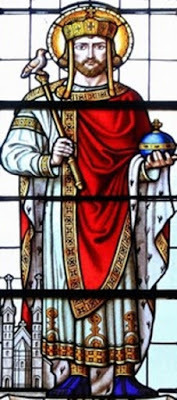 Here we are in the early years of a new millennium. History has been quite crazy. People freaked out in '99 and thought the world was going to end.
Here we are in the early years of a new millennium. History has been quite crazy. People freaked out in '99 and thought the world was going to end.But it didn't.
Efforts were being made to unify Europe. Islamic militants were on the advance. The Germans were playing a crucial role. Kiev was in the news. So were the Greeks.
I'm looking at the beginning of the second millennium. Yes, as in "a thousand years ago." The eleventh century was a period of complex politics, envy, greed, ambition, scandalous morals, sinners everywhere, and a few saints.
One of those saints was a man known to history as Emperor Henry II. The "Holy Roman Emperor" Henry II the Saint. Today is his feast day.
Henry is dear to me. He loved the poor. He fostered evangelization. He sponsored the "missionary diocese" of Bamberg on what was then the fringe of the Christian world, in order to bring the Gospel to the northeastern Slavic tribes.
And at Bamberg he supported the foundation of the Benedictine Abbey of Saint Michael, to which he attached himself as a lay collaborator, living the Benedictine spirit in the midst of the secular world as an "Oblate."
He is the patron saint of Benedictine Oblates. He is also the patron of disabled people, and this is another reason why I love him. He was afflicted with various chronic illnesses, and had a significant limp.
He did his best to use his authority to foster the peace and good of the Church. Nevertheless, religion and politics were deeply interwoven, and Henry couldn't help setting precedents and building up the structures of what would soon become the "investiture crisis" and then blossom into the ongoing medieval struggle between Church authority and civil power.
The best of political solutions can only be temporary, and will eventually be the occasion of new problems. Humans can't be "fixed" by politics. That's why Jesus came.
**************************************************************************
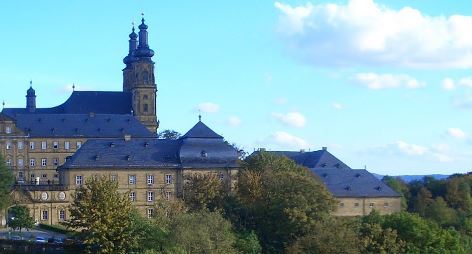 Saint Michael's Abbey, Bamberg, GermanyNevertheless, it's interesting and educational to examine the ways that people have tried to wrestle with the problem of being human.
Saint Michael's Abbey, Bamberg, GermanyNevertheless, it's interesting and educational to examine the ways that people have tried to wrestle with the problem of being human.So let's explore this path a bit.
Allow me to give space to my imagination here, and attempt to describe the situation of Saint Henry's time. Note well, this is an attempt to describe the situation. I am not advocating any kind of RESTORATION of these circumstances or these kind of political aspirations. What I want to do is to understand how people saw things at the dawn of the second millennium -- to try to see "the past" as decisions-yet-to-be-made, experiments not yet tried.
Let us attempt to step into a historical environment without the benefit of a thousand years hindsight. What did the world look like in 1015? What we call "the Middle Ages" didn't conceive of itself as being in the middle of anything. It was an age that looked back and looked forward to a political ideal, a world of peace, a world of unity-in-diversity, of culture, education, and leisure, a world that was known as the Imperium.
Today we think of "Empire" as a word that signifies tyranny and oppression. We associate it with cruel dictators and totalitarian control. Our "Western" ancestors, however, did not regard it as such. Rather, they saw it as a check on arbitrary violence, as an institution that prevented the dominance of raw power and individual whims over the common good, and as the foundation for order and the flourishing of civilized life.
They struggled to realize and renovate what was for them the greatest achievement of politics, the Imperium Romanum: the best kind of government they had ever known, and what they saw as their best hope of fostering justice, equity, fairness, impartiality, constructive activity, and defense against lawlessness and banditry. For these earlier Europeans, the Roman Empire was not looked upon as a distant memory of the past.
In fact, it was not considered a "past memory" at all.
Rather, it was an ongoing project, though admittedly one which had had some significant setbacks. It was the great hope of the second millennials that the Roman order was not only being renewed and solidified. It was being purified and elevated by Christianity.
It was destined, they hoped, to be a real reflection of Christ's kingdom in this world: the Christian people living in peace and united in bringing His benevolent reign to the ends of the earth. It was Christendom.
(In retrospect, we might say, "Christendom 1.0" -- but before we dismiss entirely this piece of primitive, clunky, bug-ridden political and historic software we would do well to attend to the ferocious viruses that have crashed our present global operating system. But I digress....)All of this sounds quite idealistic, and it was never really more than that. Jesus never promised success in this present world. Second millennials, nevertheless, can't be entirely blamed for being a bit "heady" in those early years.
After all, in the year 1000, there was a Christian Roman Empire.
Actually, that's not quite true, and herein lies the biggest of all the many big problems: there were, in fact, two "Christian Roman Empires" with two "Roman Emperors" in two distinctive (but overlapping) territories.
What we call "the Byzantine Empire" knew itself simply as the Roman Empire, with its capital in Constantinople, the "New Rome" for over 600 years, ruled by Christian emperors, full of Christian churches and monasteries and also plenty of worldly splendor and wealth and corruption. To the west were the vigorous tribes and peoples who, when they became Christians, also identified themselves as "Romans."
At first they had placed themselves in at least a nominal relationship to the Emperor in Constantinople, but increasingly they took their political as well as religious identity from the "Old Rome," the guardian of the ancient imperial mystique but also the church founded on the head of the Apostles, Saint Peter.
The tenth century had been a messy period all over Europe, but the Germanic kings had once again emerged to claim their role as protectors of the Pope and emperors of the Old Rome.
To say this was a tense situation would be an understatement. But there was hope. The churches of Rome and Constantinople were still united at the end of the first millennium. It was a rocky relationship, but it's hard to imagine that anyone foresaw the chasm that was about to crack open.
Indeed, from a political point of view, there were good reasons for hope. The Germans and "the Greeks" both saw "the problem" and they were seeking a solution: marriage.
The beginning of the second millennium saw a rising star: the marvelous Otto III, devout, educated, full of idealism, son of the German Emperor and his wife, a member of the Byzantine royal family. The daughter of the current Byzantine Emperor sailed for Italy in the year 1001. She was espoused to Otto. The wedding of the two Imperial houses would have created a unified succession.
Political unity between Constantinople and Rome, East and West.
And then Otto suddenly took ill and died at the age of 21. The future Empress Zoe returned to Constantinople.
Saint Henry was already married by then, and his successors pursued other courses. By the middle of the century, the Great Schism had begun. No one could have dreamed that another thousand years would pass without healing.
Human plans are fragile things.
"For present glory is fleeting and meaningless, while it is possessed, unless in it we can glimpse something of heaven’s eternity" (attributed to Saint Henry II).
Published on July 13, 2015 20:57
July 11, 2015
Benedict's Option
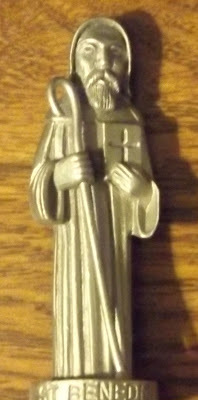 Today is the Feast of St. Benedict.
Today is the Feast of St. Benedict.St. Benedict was a man who went off into the desert in search of God. He sought to dedicate himself to God alone.
He had no project.
He did not plan to establish a monastery.
He did not plan to found a religious order.
He did not plan to lay the foundations for the Christian civilization of the Middle Ages.
He did not plan the preservation of classical learning and culture.
He did not plan to feed the poor, care for the sick, found schools, or become a counselor to the great and powerful.
He sought only to give himself to God. He found God in the desert. He found Him in silence and prayer.
He also found Him in obedience, which for Benedict meant responding to the little things that God gave him. It meant loving God in those first followers who sought him out. It meant helping them to live together as brothers. It meant writing his directives down, as a rule "for beginners."
Silence, prayer, obedience, humility, love. These are still the things that really matter. These are the things that build up the heart of the Church. But we must acknowledge all of God's gifts: it is also this radical self-forgetfulness of love for Christ that builds up the world. St. Benedict was not aware of this, but God used him nonetheless, and for centuries in the West he has been known as the "Father of Europe." By seeking God after his example and according to his rule, Benedict's followers would also change the history of the world.
Benedictine monasteries rose out of the ruins of the Latin Roman Empire, preserved and fostered much that was good from antiquity, and inspired and helped shape the institutions of the new peoples who built Western Europe's Christian culture.
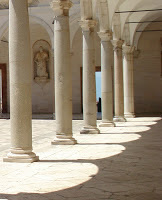 Our world today may be on the threshold of a new dark age. Are there, even now in our midst, the "St. Benedicts" whose prayer and sacrifice are sowing the seeds of a new Christendom in the future? Or is this not in some way the calling of each of us? We must go into the desert of daily life, in this world which cannot but be a world of sorrows because we are not yet in the embrace of the God for whom we have been made.
Our world today may be on the threshold of a new dark age. Are there, even now in our midst, the "St. Benedicts" whose prayer and sacrifice are sowing the seeds of a new Christendom in the future? Or is this not in some way the calling of each of us? We must go into the desert of daily life, in this world which cannot but be a world of sorrows because we are not yet in the embrace of the God for whom we have been made.We must go into the desert of our hearts that are so distracted, and we must cry out for His mercy and healing. We must live in the midst of a world that has tried to make God absent, that has obscured the signs of His presence, and we must seek Him and stand with Him as He unites Himself to humans in their loneliness.
This is what makes the world a better place: knowing that we are made for Something greater than this world, and letting that "Something" touch us in the midst of this world and shape our way of looking at everything.
Published on July 11, 2015 20:56
July 10, 2015
True "Greatness" is Found in Giving Ourselves
"God is not one who wills only greatness. God is love, who gives himself first in the Trinity, and then in creation. And to imitate God means going out of oneself; it means giving oneself in love" (Benedict XVI).
Pope Benedict speaks of "greatness" in the way that we conceive of it, our human conceptions. In our pride, we try to imitate God (or take His place) by making ourselves "great."
And so we grasp for power, whereas God wants to make us like Him by enabling us to give ourselves in love, to share in His love.
Here is a larger quotation from Benedict XVI's homily (I'll date it if I can find the date):
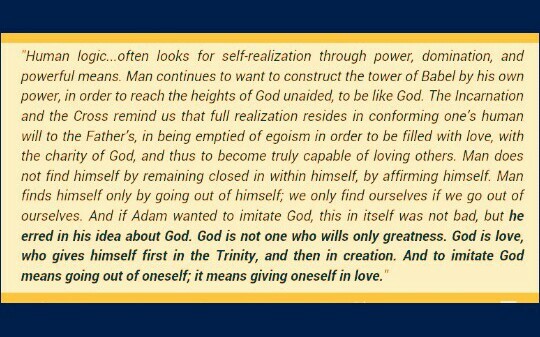
Pope Benedict speaks of "greatness" in the way that we conceive of it, our human conceptions. In our pride, we try to imitate God (or take His place) by making ourselves "great."
And so we grasp for power, whereas God wants to make us like Him by enabling us to give ourselves in love, to share in His love.
Here is a larger quotation from Benedict XVI's homily (I'll date it if I can find the date):

Published on July 10, 2015 19:44
July 8, 2015
The Holy Family: What About the Relatives?
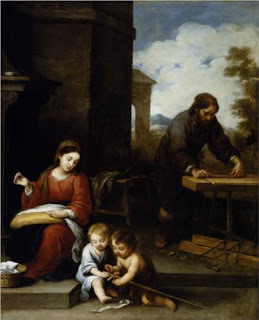 Bartolome Esteban Murillo, Holy Family (1670)Last Sunday, the Gospel reading spoke of Jesus's first visit to Nazareth after he had begun his public ministry. Everyone had heard the reports of his mighty deeds, and yet, when he stood up in his hometown synagogue, the locals seemed to find it all a bit too much to take.
Bartolome Esteban Murillo, Holy Family (1670)Last Sunday, the Gospel reading spoke of Jesus's first visit to Nazareth after he had begun his public ministry. Everyone had heard the reports of his mighty deeds, and yet, when he stood up in his hometown synagogue, the locals seemed to find it all a bit too much to take.They couldn't understand why their Jesus, whom they'd known as far back as they could remember and had seen day after day, was all of a sudden a big shot. "'Is he not the carpenter, the son of Mary, and the brother of James and Joses and Judas and Simon? And are not his sisters here with us?' And they took offense at him. Jesus said to them, 'A prophet is not without honor except in his native place and among his own kin and in his own house'" (Mark 6:3-4).
Eventually, some of these people followed him. They saw by faith that his ministry was rooted in the extraordinary way that he had lived normal life all those years in their midst. They saw this reflected also in his mother Mary, and in Joseph (whom they remembered). Those who overcame the temptation to "take offense" -- who refused to be closed up in their jealousies, their narrowness, or in the cynicism that thinks it has nothing new to learn -- would have wanted to follow him beyond Nazareth, to share in his work of building a greater house.
This passage is significant in so many ways, but I just want to reflect upon the context it reveals. All those years of the "hidden life" at Nazareth were probably a lot more crowded, busy, and noisy than we generally imagine.
It is beautiful to meditate on how the Holy Family encouraged and sustained one another in a profound and vital holiness that also passed through years of uneventful time and ordinary, daily responsibilities. It is also worthwhile, however, to consider what "normal life" actually meant in Nazareth in Palestine, two thousand years ago.
We tend to imagine the Holy Family living in a home pretty much like ours (just like Murillo, above, puts them into an unostentatious but comfortable and spacious 17th century environment). And we often envision them as alone, even perhaps a bit isolated (or at least appearing as such).
But I wonder... perhaps the greatest daily challenge for the Holy Family may have been the not-so-holy extended family and neighbors that they probably ate, drank, worked with, and even slept under the same roof with during all this time. Was not the home in Nazareth and its immediate environment a living space -- awkwardly divided -- and occupied by, basically, everybody? Jesus, Mary, and Joseph... and who else?
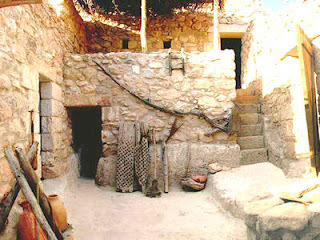 Typical Palestinian first century dwellings looked like this.
Typical Palestinian first century dwellings looked like this.Everybody all together! (...as this reconstruction illustrates)Mary's parents, while they were still alive, were close at hand. (It's not like Joachim and Anna would have retired and moved to Florida.) Then there were aunts and uncles and all those cousins who get translated as "adelphi" ("brothers") in the Greek New Testament. Mary and Joseph lived with Jesus and his "kin" -- the whole big, affectionate, bickering, sometimes nosy extended family such as can still be found today in the cultures of the Levant.
The "neighbors" (how did they arrange living space, I wonder?) were probably relatives too. We could try to imagine what work and cooking and all that was like, but what strikes me most is that the Holy Family was surrounded by people whom they were called to love every day.
This is an image that challenges me: Mary and Joseph were contemplatives in the midst of the world. The "hidden life" of Nazareth was in their hearts, as they lived cheek-to-jaw with "the brothers of Jesus" and all the rest of the family and the people who "knew them," living with a mystery that they could not communicate except through love.
We, too, are called to live with Jesus in the midst of so many of our human brothers and sisters who need to come to know Him, to be touched by Him through gestures of love that embrace the familiarity of each day with patience, kindness, simplicity, ardor, and courage.
May the Lord enable us, like the Holy Family, to live as companions of those around us, offering compassion, not fleeing from the ordinary circumstances of life but cherishing them, and building with them a house big enough for all the world.
Published on July 08, 2015 20:09
July 7, 2015
Champions at Last!
 We won. We won the World Cup!
We won. We won the World Cup!Our whole family was glued to the television in these days. It's difficult to find a sporting event that we all like, but the World Cup fits the bill. We love our World Cup soccer!
And this year, for the first time, our team won it all.
I don't feel the need to add a qualifying term to this statement, as though the fact that I'm talking about the United States Women's National Team somehow diminishes the achievement. Women's soccer stands on its own merits, and people who really appreciate sports don't need to be convinced of this fact.
These are outstanding athletes who are building great teams, exciting and dynamic teams that deserve more attention and enthusiasm for their efforts.
And they're beginning to get it.
 Great Ladies: USWNT 2015Ironically, the one country that undervalues soccer in general has been awakened by the drama, the style, and the brilliance of its own women's team. The country where many people say that watching a soccer match is like watching paint dry is paying attention to this team because they really are the best in the world.
Great Ladies: USWNT 2015Ironically, the one country that undervalues soccer in general has been awakened by the drama, the style, and the brilliance of its own women's team. The country where many people say that watching a soccer match is like watching paint dry is paying attention to this team because they really are the best in the world.It helps that so many young people in America (boys and girls) are playing "the beautiful game" these days. It's inspiring to them to see these young women who work hard to hone their craft, to play together as a team, to take risks and come through in the big games, and to be gracious on the pitch, always -- in the losses of previous years as well as in this year's victory.
I look at the veterans of this team. They were the new, or relatively new faces of 2007, people like Carli Lloyd, Heather O'Reilly, Hope Solo. Our family remembers 2011 with its heart-stopping victories and its disappointment in the final against Japan. The gold medal at the 2012 Olympics only went part of the way to fixing that.
 Carli Lloyd kisses the trophy after scoring three goals in the finalThis year even Josefina was aware of what was going on. Teresa has been playing soccer and the other girls play team sports. And indeed, anyone who plays or appreciates a team sport was treated to a display of how-to-do-it-together.
Carli Lloyd kisses the trophy after scoring three goals in the finalThis year even Josefina was aware of what was going on. Teresa has been playing soccer and the other girls play team sports. And indeed, anyone who plays or appreciates a team sport was treated to a display of how-to-do-it-together.When the women lifted the trophy, Josefina asked, "Is that the cup?"
"You bet it is, kiddo."
"But it's not a cup. It's a ball."
Well, there is a design that suggests a cup around the ball and actually it's nicer than the men's trophy but I can't explain this to an eight year old while everyone else is jumping around and celebrating.
Congratulations Team USA!!!

Published on July 07, 2015 20:37
July 4, 2015
Find Freedom's Fulfillment in the Truth

From the Homily of Pope John Paul II in the United States of America (Baltimore, Maryland) Oct 8, 1995
Dear brothers and sisters in Christ:
openness to the Lord,
a willingness to let the Lord transform our lives,should producea renewed spiritual and missionary vitalityamong American Catholics.
Jesus Christ is the answerto the question posed by every human life,and the love of Christ compels usto share that great good news with everyone.We believe that the death and resurrection of Christreveal the true meaning of human existence;therefore nothing that is genuinely humanfails to find an echo in our hearts.Christ died for all,so we must be at the service of all....
Christian witness takes different formsat different moments in the life of a nation.Sometimes, witnessing to Christwill mean drawing out of a culturethe full meaning of its noblest intentions,a fullness that is revealed in Christ.At other times, witnessing to Christmeans challenging that culture,especially when the truth about the human personis under assault.
America has always wanted to be a land of the free.Today, the challenge facing Americais to find freedom's fulfillment in the truth:the truth that is intrinsic to human lifecreated in God's image and likeness,the truth that is written on the human heart,the truth that can be known by reasonand can therefore form the basis of a profoundand universal dialogue among peopleabout the direction they must give to their livesand their activities.
Catholics of America!Always be guided by the truth,by the truth about God who created and redeemed us,and by the truth about the human person,made in the image and likeness of Godand destined for a glorious fulfillmentin the Kingdom to come.Always be convincing witnesses to the truth."Stir into a flame the gift of God"that has been bestowed upon you in baptism.Light your nation, light the world,with the power of that flame!
Published on July 04, 2015 19:00
July 3, 2015
Holy Spirit, Come into My Life
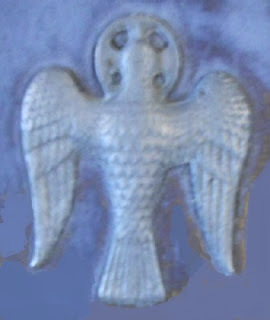 Christianity is not external to the real concerns of my life. It illuminates them and opens me up to their true meaning.
Christianity is not external to the real concerns of my life. It illuminates them and opens me up to their true meaning.But this only happens if I live the relationship with God that He continually desires to deepen throughout my life.
And how can I live and grow in a relationship with Eternal Love except by asking for Him to change me, asking for Him to empower me to love Him more, asking Him to enable me to see the Church as the instrument of His love, and her teachings as the road of love that really corresponds to my life?
I want Him to "come" into my life, deepen my relationship with Him, and make me more aware of His presence. This is why I must ask, continually, for the gift of the Holy Spirit to be renewed within me.
This is why my whole heart has to be a living, loving, begging prayer for God's grace.
Published on July 03, 2015 12:30
July 2, 2015
Home But Not Bored
 We had a Monopoly marathon going on all day long.
We had a Monopoly marathon going on all day long.This is what happens on wet summer days. Agnese is the only one not playing here, but she's in the room in a chair near me, reading.
It's great to see all of them together. This is precious time. God grant that they always stay connected, somehow, even if their paths take them far away.
And that they always love one another.
Do I even need to tell you who the big winner was?

Published on July 02, 2015 20:29



